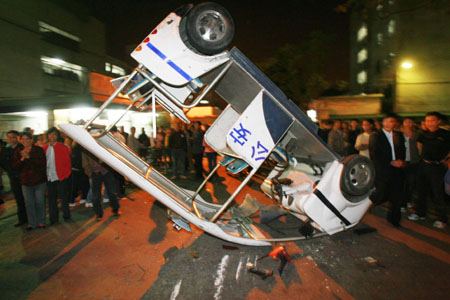
This was the leading photo in yesterday's China Daily for a story headlined, 'Toy factory dispute settled.' Taken in southern Guandong Province, this car had been overturned when 500 employees rioted after being laid off with only one month's compensation.
The workers started rallying at the gate, but were soon joined by others. "About 1,000 police and security guards were called in to disperse the crowd. This infuriated the protesters, who overturned a police vehicle, smashed at least four police motorcycles and broke windows and damaged computers in the company's office building," according to the article. READ THE STORY HERE.
Regardless of this actual story, which apparently got resolved and workers were justly compensated, this photo knocked me out. The image was in the center spot of page 4, with a teaser on page 1. It took up one-third of the page! It looks so much like something out of Iraq that I actually laughed out loud when I read the headline, 'dispute settled.'
I think my journalism friends will agree that this photo just doesn't scream "resolved."
I see this in the China Daily all the time: a glaring disconnect between the headline and the photo, or the headline and the actual article. I think it's fair to say the placement of this photo was poor, but there may be several reasons for this.
1) There is no competition for the China Daily, the Party paper, so they don't have to be good.
2) This paper uses a journalism of assertion. This Party report tells you the problem is fixed. Maybe this is why the editors didn't see the disconnect between the photo and the report as a problem; the gov't is saying it's resolved, so it's resolved.
3) The audience for the China Daily largely consists of expats who are on rotation in China; when they leave after two years, different expats come in. They're not the kind of audience to even get the daily paper, let alone demand higher quality from their paper.
It's certainly a different kind of journalism.






